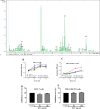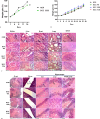Nutrients and phytochemicals characterisations, acute and sub-acute oral toxicity studies of BobyGuard C, a polyherbal nutraceutical with anti-breast cancer properties
- PMID: 40376450
- PMCID: PMC12078229
- DOI: 10.3389/ftox.2025.1598185
Nutrients and phytochemicals characterisations, acute and sub-acute oral toxicity studies of BobyGuard C, a polyherbal nutraceutical with anti-breast cancer properties
Abstract
Background: In 2022, approximately 2.3 million new cases of female breast cancer and 670,000 related deaths worldwide despite significant advancements in conventional treatments. BobyGuard C (BGC) is a novel polyherbal nutraceutical formulated from five plants, selected for their antioxidant, anticancer, anti-inflammatory and nutritional properties to be used for breast cancer management. This study aimed to characterize its physicochemical, nutritional, and phytochemical properties as well as assess its safety through acute and sub-acute oral toxicity studies in Wistar rats.
Methods: Thecomposition of BGC was analyzed for macronutrients, minerals, and phytochemicals using standard methods. Antioxidant activity was assessed through DPPH, TAC and FRAP assays, while antiproliferative activity was evaluated using the MTT assay on MDA-MB 231 and MCF-7 breast cancer cell lines. Acute (single 5,000 mg/kg dose with 14 days observation) and sub-acute oral (daily administration of 784, 1,568, and 3,136 mg/kg for 28 days) toxicity studies in female Wistar rats followed OECD guidelines.
Results: BGC was found to be rich in proteins (38.36 g/100 g), carbohydrates (59.70 g/100 g), and essential minerals such as magnesium (60,066.67 µg/100 g), and it was free from toxic heavy metals. Several bioactive compounds, including diosgenin, diosbulbin H, β-carotene, Bafoudiosbulbin G and catechin were identified in BGC. Phytochemical analysis revealed high levels of phenols (9,783.48 mg GAE/100 g), flavonoids (47.72 mg QuE/100 g), and alkaloids (106.14 mg berberine eq/100 g), contributing to its strong antioxidant activity (DPPH inhibition: 90.39%). BGC exhibited significant antiproliferative effects on MDA-MB 231 cells, highlighting its potential anticancer activity. Acute toxicity tests showed no mortality at 5,000 mg/kg, with an LD50 exceeding this dose. In the sub-acute 28-day repeated-dose oral study, doses up to 3,136 mg/kg/day resulted in some dose dependent hematological and biochemical changes but no histopathological abnormalities were observed indicating its safety at lower doses.
Conclusion: BGC is a nutritionally rich formulation with potent antioxidant and anticancer potential, demonstrating a favorable safety profile at lower dose (784 mg/kg).
Keywords: BobyGuard C; acute toxicity; nutrient; phytochemical; standardization; subacute toxicity.
Copyright © 2025 Mafogang, Ponka, Mukam and Fokou.
Conflict of interest statement
The authors declare that the research was conducted in the absence of any commercial or financial relationships that could be construed as a potential conflict of interest.
Figures


References
-
- ACS (1992). AOAC international. Anal. Chem. 64, 832A. 10.1021/ac00041a722 - DOI
-
- Atere T. G., Akinloye O. A., Ugbaja R. N., Ojo D. A., Dealtry G. (2018). In vitro antioxidant capacity and free radical scavenging evaluation of standardized extract of Costus afer leaf. Food Sci. Hum. Wellness 7, 266–272. 10.1016/j.fshw.2018.09.004 - DOI
LinkOut - more resources
Full Text Sources
Research Materials
Miscellaneous

